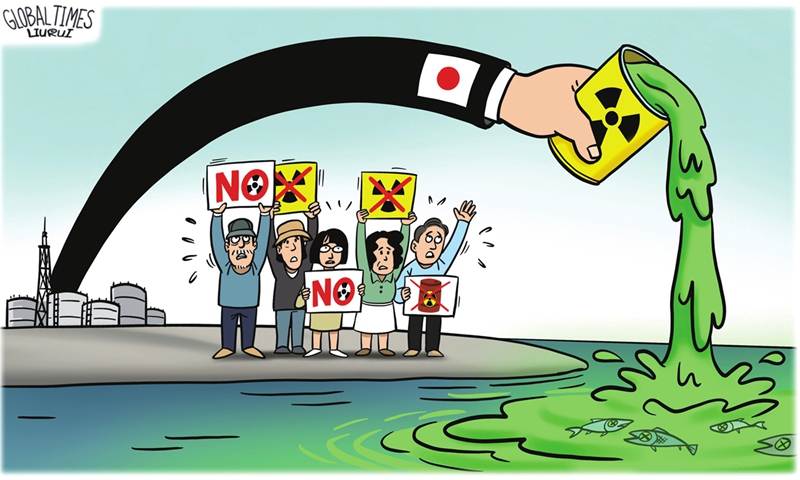
Japan's dangerous move.Illustration:Liu Rui/GT
In response to the Japanese government's insistence on dumping nuclear-contaminated water into the sea from its crippled Fukushima Daiichi nuclear power plant, opposition from the international community continues to surge. Okada Takashi, a guest researcher at Japan's Kyodo News stated in an interview with the Global Times on Sunday that major issues such as the total amount of contaminated water from Fukushima and its impact on the environment have not been resolved, and it is necessary for the Japanese government to suspend the dumping plan, which will start as soon as August, and reconsider how to properly deal with the contaminated water.
Okada recently wrote on the US news outlet Business Insider that the Japanese government and media are attempting to use the International Atomic Energy Agency (IAEA)'s comprehensive assessment report on Fukushima's nuclear-contaminated water disposal to advocate the "safety" and "legitimacy" of dumping.
In the interview with the Global Times, he further elaborated that by manipulating the expression and content of information, they have created a public opinion environment favorable to themselves.
The IAEA released a comprehensive assessment report on Japan's dump of nuclear-contaminated water on July 4, stating that Japan's dump plan generally conforms to international safety standards. IAEA Director General Rafael Mariano Grossi then stated that the IAEA carried out review and evaluation at the request of the Japanese government and did not endorse the decision for Japan to dump.
However, as stated by Chinese Foreign Ministry Spokesperson Wang Wenbin, the agency's report cannot serve as a "shield" or "green light" for Japan's dumping plan. Chinese Ambassador to Japan Wu Jianghao held a special press conference on July 4 on the issue, which he stated that the IAEA's report cannot prove the legitimacy of Japan's sea dumping plan.
In response to China's stance, the Japanese media outlet Asahi Shimbun published a comment article saying, "It is hard not to suspect that the Chinese government is using the issue of treated water as a way to put pressure on Japan and promote internationally the view that it is Japan that is disrupting the international order." Japanese TBS TV station then said that the issue has become a political issue, and it is a "diplomatic card" in China's hands.
Okada pointed out that opposition to the dump plan is not only from China, but also from Australia, New Zealand, Papua New Guinea and other Pacific Island countries. The Japanese government is trying to use the IAEA assessment report to endorse its dump behavior, and it claims that the reasonable concerns of local fishermen in Fukushima, civil groups, China, and Pacific Island countries are "unscientific." Isn't this an overly arrogant attitude? He asked.
Okada told the Global Times on Sunday that the IAEA assessment report stated that the dump plan was the decision of the Japanese government. The report neither "recommends" nor "approves" this. This is because the Japanese government first made the decision to dump Fukushima's nuclear-contaminated water into the sea in April 2021, and then commissioned the IAEA to conduct a safety assessment of its water treatment system. The scope of the IAEA's assessment is limited to this and does not involve evaluation and review of the legality of dumping into the sea.
Okada bluntly said that the Fumio Kishida regime tried to use the conclusion in the IAEA assessment report that "generally conforms to international safety standards" to endorse, emphasizing the "safety and legitimacy" of the dump behavior. This is actually a typical case of the Japanese government and media jointly guiding public opinion, manipulating the expression and content of information to create a public opinion environment favorable to themselves.
This approach has already had some effect. A public opinion survey conducted by the Japanese Daily News from July 23 to 24 showed that 44 percent of respondents said they "do not feel uneasy" about the dump, a higher percentage than those who answered "feel uneasy" with 35 percent. "But this manipulation also has limitations. For example, 53 percent of respondents think that the explanations of the Japanese government and Tokyo Electric Power Company are 'insufficient,' while those who think the explanations are 'sufficient' account for 24 percent," Okada told the Global Times.
In the interview, Okada also stated that the IAEA assessment report does not mention any alternatives to dump the contaminated water. Besides, the total amount of nuclear-contaminated water dumped into the sea, the total amount of radioactive substances, and the impact on the environment are still major unresolved issues. Therefore, it is necessary to suspend the dump behavior that may begin as early as August and reconsider how to dispose of nuclear-contaminated water.
Okada also said that after the US President Joe Biden administration took office, Japan's follow-up to the US on issues such as the Taiwan question led to a deterioration in relations with China, and the dump of Fukushima nuclear-contaminated water would undoubtedly plunge the current China-Japanese relationship into a continually negative state.
Recently, US Secretary of State Antony Blinken and Treasury Secretary Janet Yellen have visited China in succession, creating opportunities for high-level direct communication between China and the US to some extent, but the Kishida regime lacks such a channel. He warned that the Kishida administration, which is busy dealing with domestic affairs in Japan, seems unable to seriously improve its relations with China, but this state must be broken as soon as possible.




